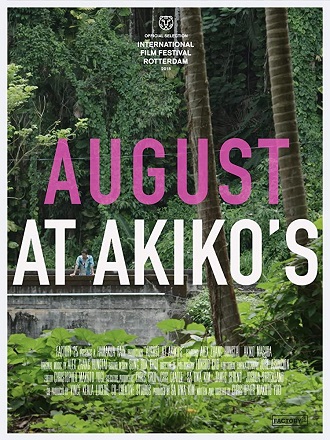
August at Akiko's 2018
Distributed by Collective Eye Films, 1315 SE 20th Ave. #3, Portland OR 97214; 971-236-2056
Produced by Sarah S. Kim
Directed by Christopher Makoto Yogi
Streaming, 75 mins
General Adult
Buddhism; Jazz
Date Entered: 11/02/2020
Reviewed by Andy Horbal, Cornell University LibraryAugust at Akiko’s definitely does have a plot. A jazz musician named Alex (Alex Zhang Hungtai, aka Dirty Beaches, aka Last Lizard) arrives on the Big Island of Hawai’i, rents a car, and drives to the home of his grandparents . . . or at least the place where it’s supposed to be. What he finds instead is a new house under development. He leaves a voicemail for his mother, smokes a cigarette, inquires at the Post Office to see if they have a forwarding address (they don’t), and wanders the neighborhood. That night, alone in his hotel room, he plays “Auld Lang Syne” on his saxophone.
The next day finds Alex checking into a Buddhist bed and breakfast run by the Akiko of the film’s title (Akiko Masuda). He talks to his mom on the phone. She tells him that his grandmother died more than a year ago and speculates that this must be why he decided to “pass on.” Suddenly absent a reason for being back in Hawai’i, he begins to settle into the routines of the place where he is staying: he joins Akiko and his fellow guests in morning meditation, participates in community service, entertains a neighborhood family’s young child, learns how to play the shamisen, and goes dancing. Interspersed throughout these scenes are a series of visions which appear to show that connecting with his roots in this way is bringing Alex closer to his grandparents even in their absence: he has come home again, even if their house is now gone.To describe film in this way, though, is to emphasize the wrong beats. Akiko, for instance, is the subject of the film’s opening shot, a long take nearly four minutes in length depicting her going about her morning routine. Later on, she is delighted to discover that she has been living alone literally since the year that Alex was born. Although Alex’s journey drives the narrative forward, hers is clearly just as important. Meanwhile, the forest and ocean landscapes they inhabit and behold spend are given as much screentime (sometimes, but not always in the form of POV shots) as they are. Similarly, although the film features original music by Hungtai, the natural (rain, waves, wind blowing through trees) and man-made (car sounds) world figures just as prominently in its soundtrack.
There is some ambiguity about what everything adds up to, which is part of August at Akiko’s charm. Early champion Richard Brody identifies director Christopher Makoto Yogi’s theme as “the very essence of artistic inspiration,” but you could just as easily construct an argument for something either more universal or culturally specific. What is certain is that it’s an accomplished debut feature made by a talented production team and starring a musician who has a real future in movies and TV if he wants it. Hungtai embodies the idea of going with the flow perfectly; wherever you believe it’s carrying Alex, Akiko, and us (the audience), the journey is well worth taking.
Awards:
Los Angeles Asian Pacific Film Festival - Special Jury Prize for Best Cinematography; San Diego Asian Film Festival - George C. Lin Emerging Filmmaker Award; Indie Memphis Film Festival - Special Jury Award for Best Departures Feature